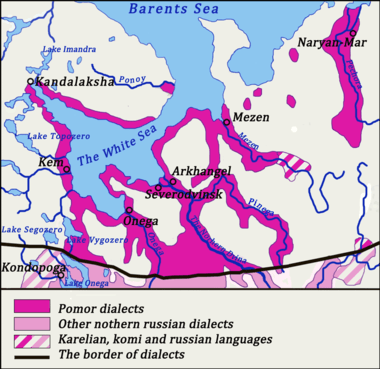Pomor dialects
Pomor dialects are a group of Northern Russian dialects or its own language widespread among the Pomors of the former Arkhangelsk Governorate and northern parts of the Olonets and Vologda Governorates.


The dialects are heavily influenced by the Old Novgorod dialect and there are a significant number of archaisms and borrowings from Uralic and Scandinavian languages. The Pomor dialects are different enough that some people even classify it as a separate language from Russian though it has no recognition from the government of Russia, it has the status of a dialect. Pomor has about 2.000-3.000 speakers and most of them are old.
Modern situation
Pomor is now a dying form of speech and only a few thousand speakers remain. Pomor is not recognised as a language but linguistically could be classified as a language. There is no education in Pomor and only way to learn it is by self study. Most parents teach their children standard Russian and not Pomor. Pomor is almost extinct in Karelia and Murmansk and small communities exist in Arkhangelsk. But there has been fresh interest in Pomor and there are revival efforts.[2]
History
The Uralic people of Bjarmia changed to Pomor in a five-century-long process, through this, Pomor gained many loans from the Uralic languages. The Pomor people were traders and from that Pomor gained a number of loans from the North-Germanic languages. During the era of Stalin, he tried to integrate the Pomors to speak standard Russian and thought that most Pomors changed to speaking standard Russian. Now only a few thousand people know Pomor.
Study
The study of the Pomor dialects was undertaken by I. S. Merkuryev (1924-2001), a professor of philology and author of several books including Живая речь кольских поморов ("The Living Speech of the Kola Peninsula Pomors").
Pomor dialects in literature
The Pomor dialects are widely used in the works of the writers and folklorists Boris Shergin and Stepan Pisakhov. Influences from them can be seen in the poetry of Nikolai Klyuev.
Pomor dialects in film
Pomor dialects are spoken in the animated films of Leonid Nosyrev (Леонид Викторович Носырев), many of which are adaptations of stories by Shergin and Pisakhov. One example is Laughter and Grief by the White Sea (1987).
Example of Pomor[3]
| Pomor | Russian |
|---|---|
| Летом насекла бабка в лесу дрофф, да во костёр-от на кулиги их склала
Зимой бабка за тема дровама в лес покатила. На кулигу-то въехала гленула: на-ко, цего элако? На костру-от медвёть сидит! Мырьё ко бабки поворотил, глазишша выкатил, пассь рашширил, да как рёвкнет: |
Летом насекла бабка в лесу дров, и в костёр на поляне их склала
Зимой бабка за теми дровами в лес покатила На поляну въехала, глянула: на кого, чего? На костре медведь сидит! Лицо к бабке повернул, глазища выкатил, пасть расширил, да как рявкнет |
| letom nasekla babka v lesu droff, da vo koster-ot na kyligi ih skala
zimoj babka za tema drovama v les pokatila. Na kupigy-to v´ehala gdenyla na-ko tsego zlako? na kostry-ot medvet´ sidit! myr´e ko babki povorotil, Glazišša vykatil, pass´ rašširil, da kak revknet |
Letom nasekla babka v lesu drov, i v kostër na poljane ih sklala
Zimoj babka za temi drovami v les pokatila Na poljanu vʺehala, gljanula: na kogo, čego? Na kostre medvedʹ sidit! Lico k babke povernul, glaziŝa vykatil, pastʹ rasširil, da kak rjavknet |
Notes
- Русские. Монография Института этнологии и антропологии
- "Ket työ oletta, pomorit?". omamua.ru. Retrieved 2020-02-03.
- "Медвёть на кулиги — СибирскаВольгота". sibwiki.lingvopolitics.org. Retrieved 2020-02-02.